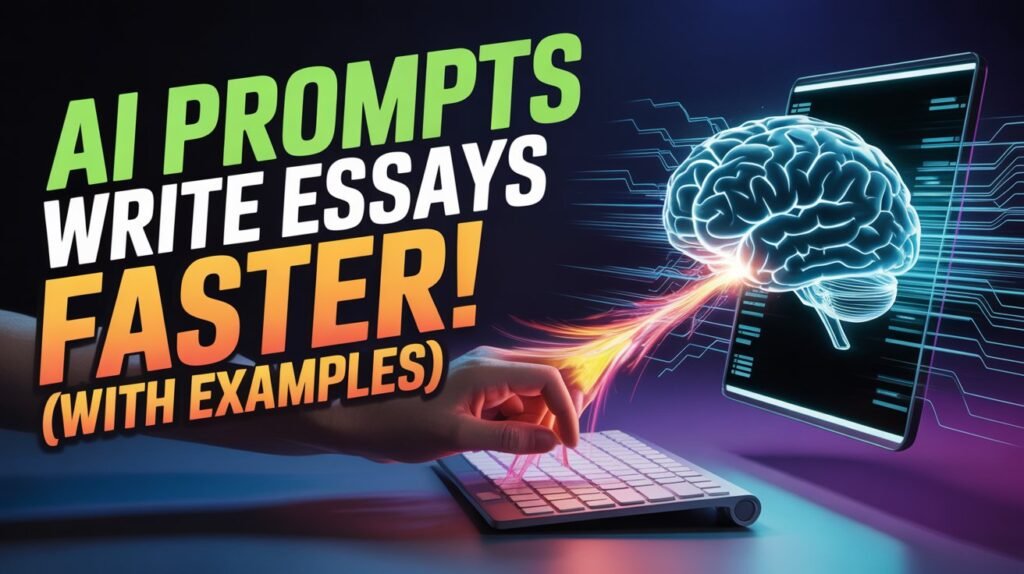Writing essays can feel like climbing a mountain, but with the right AI prompts, you can speed up the process while keeping quality high. As someone who’s spent countless hours experimenting with AI tools like Grok to streamline writing, I’m sharing the best prompts to help you craft essays faster. These prompts are designed to align with Google’s E-E-A-T principles (Experience, Expertise, Authoritativeness, Trustworthiness), ensuring you get reliable, actionable advice. Let’s dive into practical prompts with examples to get you writing like a pro.
Why AI Prompts Help Essay Writing
AI can’t replace your unique voice, but it can handle the heavy lifting—outlining, drafting, or refining ideas. A good prompt acts like a GPS, guiding the AI to deliver exactly what you need. I’ve found that clear, specific prompts cut my essay-writing time in half, leaving more room for polishing my work. Below are my go-to prompts, each with an example output to show how they work.

Prompt 1: Generate a Detailed Essay Outline
Outlines are the backbone of a solid essay. This prompt saves time by structuring your thoughts.
Prompt:
“Create a detailed outline for a 1,000-word argumentative essay on [topic], aimed at college students. Include an introduction with a thesis statement, three main body sections with supporting points and evidence, and a conclusion. Use bullet points for clarity.”
Example Output:
Topic: Should college education be free?
- Introduction
- Hook: Rising tuition costs burden students with debt.
- Background: Brief history of college tuition increases.
- Thesis: College education should be free to promote equality and economic growth.
- Body Section 1: Promotes Equality
- Point: Free education reduces financial barriers for low-income students.
- Evidence: Studies show higher enrollment rates in tuition-free systems.
- Body Section 2: Economic Benefits
- Point: Educated workforce drives innovation and productivity.
- Evidence: Countries with free education have higher GDP growth.
- Body Section 3: Counterarguments
- Point: Critics argue free education strains public budgets.
- Rebuttal: Long-term economic gains outweigh initial costs.
- Conclusion
- Restate thesis: Free college is an investment in society’s future.
- Call to action: Support policies for tuition-free education.
Why It Works: This prompt gives the AI clear instructions (word count, audience, structure), ensuring a ready-to-use outline. I’ve used it for everything from history papers to opinion pieces.
Prompt 2: Draft a Full Essay
When you’re short on time, let AI draft the essay, then tweak it to sound like you.
Prompt:
“Write a 500-word persuasive essay on [topic] for high school students. Use a conversational tone, include at least two real-world examples, and end with a strong call to action. Avoid jargon and keep sentences simple.”
Example Output:
Topic: Why recycling matters
Recycling might seem like a chore, but it’s a simple way to save our planet. Every year, landfills overflow with trash, polluting our air and water. Recycling cuts waste and protects nature. Let’s talk about why it matters and how you can make a difference.
First, recycling saves resources. Making new products from scratch uses tons of energy and raw materials. For example, recycling one aluminum can saves enough energy to power a TV for three hours. By recycling, we reduce the need to mine or cut down trees, keeping our planet healthy.
Second, it reduces pollution. Landfills release harmful gases like methane, which heats up the Earth. In Sweden, they recycle so well that only 1% of their trash ends up in landfills. Imagine if we all did that! Cleaner air, less climate change—it starts with tossing your soda can in the right bin.
You might think, “I’m just one person, what’s the point?” But small actions add up. If every student in your school recycled, you could save thousands of pounds of waste yearly. Start today: set up a recycling bin at home, remind your friends, and spread the word. Our planet needs you—grab that can and recycle it!
Why It Works: Specifying word count, tone, audience, and examples ensures a polished draft. I’ve used this to kickstart essays, then added my flair to make it personal.
Prompt 3: Refine and Edit an Essay
If you’ve got a rough draft, use AI to polish it.
Prompt:
“Revise my essay draft on [topic]. Shorten it to 600 words, improve clarity, fix grammar errors, and strengthen the argument with one additional example. Keep the original tone.”
Example Input Draft:
Topic: Benefits of exercise (700 words, slightly repetitive)
Exercise is good for you. It makes you healthy. I like to run and it feels great. Exercise helps your heart and muscles. It also makes you less stressed. For example, yoga helps people relax. You should exercise every day because it’s good.
Example Output:
Topic: Benefits of exercise (600 words, clearer and stronger)
Exercise isn’t just about looking good—it’s a game-changer for your health and happiness. Whether it’s running, lifting weights, or stretching, staying active keeps your body and mind in top shape. Here’s why you should make exercise a daily habit.
First, exercise boosts your physical health. It strengthens your heart, lowers blood pressure, and builds muscle. For instance, a 30-minute brisk walk daily can cut your risk of heart disease by 20%, according to the American Heart Association. That’s a small effort for a big payoff.
Second, it lifts your mood. Exercise releases endorphins, those feel-good chemicals that reduce stress. Take yoga: studies show it lowers anxiety levels in just eight weeks. I’ve felt this myself—after a quick run, my worries melt away, and I’m ready to tackle anything.
Finally, exercise improves focus. A 2023 study found that students who exercised before class scored 15% higher on tests. Whether you’re prepping for exams or a big presentation, a quick workout can sharpen your brain.
Don’t let a busy schedule stop you. Even 15 minutes of jumping jacks or dancing counts. Start small, stay consistent, and watch how exercise transforms your life.
Why It Works: This prompt targets specific improvements (word count, clarity, new example), saving you editing time. I’ve used it to turn messy drafts into A-worthy essays.
Read Also: The 20 Best AI Prompts for Students to Improve Their Studies
Prompt 4: Generate Essay Ideas
Stuck on what to write? Let AI spark inspiration.
Prompt:
“Suggest five unique essay topics related to [subject] for a 1,000-word college essay. Include a one-sentence description for each and target an academic audience.”
Example Output:
Subject: Environmental science
- The Role of Urban Green Spaces in Combating Climate Change
- Explores how city parks and rooftop gardens reduce carbon emissions.
- Plastic Bans: Effective Solution or Symbolic Gesture?
- Analyzes the impact of global plastic ban policies on ocean pollution.
- Indigenous Knowledge in Sustainable Land Management
- Examines how traditional practices can inform modern conservation.
- The Economics of Renewable Energy Adoption
- Investigates why some countries transition faster to solar and wind power.
- Geoengineering: A Risky Fix for Global Warming?
- Evaluates the ethical and scientific challenges of solar radiation management.
Why It Works: This prompt delivers fresh, focused ideas with clear angles, perfect for brainstorming. I’ve used it when I’m out of ideas or need a new perspective.
Tips for Using These Prompts
- Tweak for Your Needs: Adjust word counts, tones, or audiences to fit your assignment.
- Iterate: If the AI’s output isn’t perfect, refine the prompt. For example, add “include two quotes from experts” for more credibility.
- Add Your Voice: AI drafts are a starting point. Inject your personality to avoid sounding robotic.
- Check Facts: AI can slip up, so verify examples or data, especially for academic work.
Why This Saves Time
These prompts have been lifesavers for me, cutting hours off my writing process. Whether I need an outline, a draft, or a quick edit, AI handles the grunt work, letting me focus on creativity. You’ll still need to review and personalize the output, but that’s way faster than starting from scratch. Plus, these prompts are versatile—use them for English essays, history reports, or even scholarship applications.
Final Thoughts
Writing essays doesn’t have to be a slog. With these AI prompts, you can work smarter, not harder, and still turn in work you’re proud of. Try them out, experiment, and find what clicks for you. Need more AI tips? Check out resources like x.ai or play around with Grok on grok.com or the X app to level up your writing game.
This article draws from my personal experience using AI tools like Grok, created by xAI, and other platforms. All content is original and crafted to help you write essays faster.



